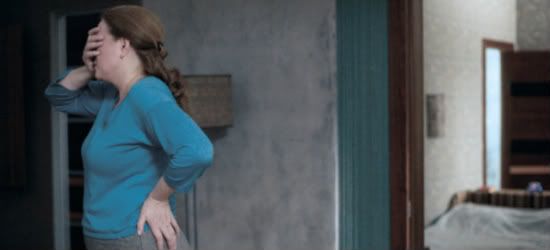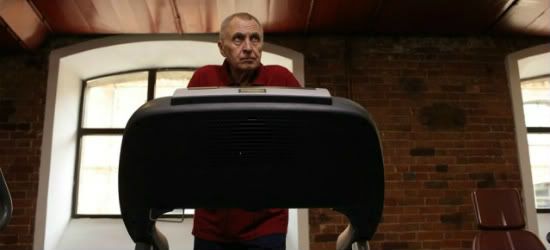
For this writer, there are fewer things in cinema more satisfying than a filmmaker in total control of their story. Sure, we love the visceral thrill of a well-choreographed, impeccably staged action sequence as much as the next red-blooded human being. And there’s the perfect combination of song/score over moving images, blissful moments heightened through all the tools available in the medium. But then there are those rare moments when a film has just begun, and the feeling sets in immediately that you’re in good hands; that no matter what happens in this film, you can trust the filmmaker has thought everything through and knows what he or she is doing. It’s a good feeling. Comforting even. But it’s rare.
When it does happen, as was the case when we caught director Andrey Zvyagintsev’s latest, “Elena,” well, we tend to fall hard for the film. It’s the very definition of a slow burn, but we’ll be damned if we weren’t gripped from the outset, and thankfully rewarded with a pitch-perfect, haunting final scene. Even the closing image, which hinges on a rather trite movie cliché – the mirroring of opening and closing shots – works like gangbusters. And the praise will not end there, because Zvyagintsev actually trusts his audience, has faith in our ability to see and understand what he’s telling us, and does so with a subtle directorial hand. He’s a filmmaker after our heart, and though we’re clearly in the honeymoon stage of this relationship (this writer intends to catch up very soon with his two previous efforts, “The Return” and “The Banishment”), it does feel like we’ve met a kindred spirit. Just writing this review has gotten us all aflutter with butterflies in our stomach.

The film opens on a beautiful house, looking from the outside in, as a crow lands on a branch in the foreground. There’s an ominous building of tension throughout “Elena.” You just know something bad is going to happen. But our guess is you won’t know exactly what this bad thing is until Zvyagintsev intends you to know. Don’t get us wrong, there’s no mind-blowing twist or anything like that. You most likely won’t be surprised where the film goes, mostly because when it turns, it just seems…perfect, a logical extension of the narrative the filmmaker has been building. It’s not a case of the director giving the audience exactly what they want, but more an example of giving us what we need from the story. There’s a big difference.
Elena (Nadezhda Markina, all nuance and pathos in a superb performance) met her second husband, Vladimir (Andrey Smirnov), when she was his nurse. The entire film takes place ten years later. They live together; seem mostly happy, if not a little aloof. You could argue that Elena is a glorified caregiver to Vladimir – they do have sex, but sleep in separate rooms – but their relationship is clearly marked by respect, care and understanding. Vladimir is nothing if not well-to-do, his house a cold but striking abode that DP Mikhail Krichman (he’s worked on every Zvyagintsev film) seemingly loves to inhabit, capturing the space with all its beautiful wood bookshelves and large windows in graceful, extended tracking shots, like an enthusiastic architecture nerd.
Both leads in the film are excellent, but it’s Markina, as Elena, who has the biggest challenge. Her role is a tough balancing act. For the film to work, we need to care about her, even when she does some dark deeds. Elena has a son through her first marriage. He’s married, with two kids, and lives a life of squalor (compared to his mother’s digs) on the other side of town. His underachieving teenage son is heading towards mandatory military service, unless Elena can convince her husband to pony up the dough for her grandson’s entry in to university. Vladimir refuses to help, but he’s thankfully never vilified. Instead, we see exactly where he’s coming from, but we also empathize with Elena’s need to be a mother. She cares and worries for people, most of all her son and his family, and can’t help but take on the burden her son refuses to accept. 
Her son, Sergey (played by Alexey Rozin) is the kind character that will anger the audience. He’s a lazy, irresponsible oaf who can’t be bothered to find work or be a good parent (instead he just yells at his son to do his homework and drinks beer all day). This is contrasted with Vladimir’s daughter, Katerina (the gorgeous Yelena Lyadova), who also seems to be something of a ne’er-do-well, but one who’s grown up without a worry in the world. Money has never been an issue for her, being the only child to a very rich man. But though Katerina seems to be even more of a spoiled child than Elena’s son (at least in her eyes), every scene with her in it peels back a layer of complexity, revealing a woman who’s suspicious of Elena’s agendas, but is still a good person who’s just cautious about who she lets in (from what we see in the film, her father is the only one who truly knows her).
“Elena” is, on the surface, most akin to a thriller, but it’s also partly a family melodrama that examines class divides in Russia. That the film explores this idea organically through its characters and story, never once taking us out of the story for some head-slapping, obvious proclamation, is yet another feather in Zvyagintsev’s cap. As is his pairing with master composer Philip Glass, whose use of strings here is as haunting as anything in his career to date.
And that’s about as much information as you should have going into “Elena,” which, if you haven’t already gleaned from this review, is a film that we really, really loved. It will certainly work better if you know very little, but it’s also not beholden to its understated twists and turns. At the risk of geeking out on this film even more, if that were even possible, we just gotta say (in full-on ‘SNL’/”The Chris Farley Show” mode): remember that super-long and elaborate tracking shot near the end of the film, where we follow a bunch of teenage boys as they pick a fairly brutal fight with some other boys? That was awesome. [A]
